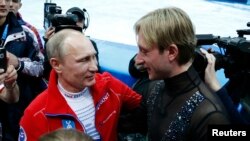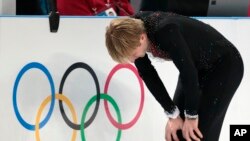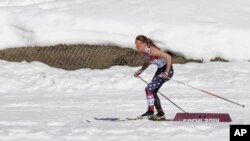SOCHI, RUSSIA —
Russia's Yevgeny Plushenko pulled out of the men's individual figure skating event at the Sochi Olympics on Thursday, just seconds before he had been due to start his short program.
Plushenko was seen clutching the base of his spine throughout his warm-up and when they announced his name as the next performer, instead of taking his position for the start of his routine, he skated up to the judges.
After an exchange with officials, a male voice announced in Russian over the Iceberg Skating Palace's public address system "Yevgeny Plushenko cannot participate due to a trauma (injury)''.
The announcement left more than 10,000 fans deflated and ended one of the most talked about careers in figure skating.
"I came out for the warm-up and in the first triple Axel I stepped out and felt like I had a knife in my back. And the second triple Axel, it was horrible one. It was a hard landing and after this I didn't feel my right leg,'' an exhausted Plushenko told reporters as he rubbed his back.
"I took four pills (painkillers) and it didn't help. I think it was God saying, 'Yevgeny enough, is enough."
The 31-year-old's participation in the men's event had been in the balance after he admitted his back started to act up during his free skate in the team competition on Sunday.
Although he managed to finish off that routine, it was a million miles off from what the world had come to expect of the Russian showman.
At the end of that underwhelming performance he said he would need ''the doctors to implant some stuff into my back" so that he could recover in time to pull off two final performances in front of his home fans.
Unfortunately for the spectators who had flocked into the arena to cheer on their favorite son, time simply ran out for Plushenko.
''This is not a tragedy what happened with Yevgeny. During the (last) 20 years, he has had good success, mostly as a winner. Don't criticize him too much," his coach Alexei Mishin said.
Barely skated
Having barely skated over the past four years, Plushenko had been drawn to perform his short program to Tango de Roxanne early on Thursday - well before all the other medal favorites were due to skate.
But the Russian looked stony-faced from the moment he stepped out for his six-minute warm-up, laboring around the rink, repeatedly clutching and pressing his back, and going up to the barriers to talk to Mishin.
After his withdrawal was confirmed, a dejected Plushenko skated to the center of the rink to bow to all four ends of the arena before waving farewell to a stunned, and somewhat muted, audience who had come to cheer him on.
Plushenko's exit ended yet another controversial chapter in his colorful career as he had been criticized for barging into the Olympics through the back door because he only secured his place following a secret test skate rather than beating his younger Russian rivals in open competition.
But he seemed to have silenced his detractors when he helped Russia to triumph in the inaugural team competition on Sunday, winning his second Olympic gold and fourth overall.
Having also announced his retirement following the 2006 and 2010 Olympics, Mishin was asked if there were any further comebacks left in Plushenko.
''Maybe in the Paralympic Games!" he replied.
Click here to see VOA's Winter Olympics site
Plushenko was seen clutching the base of his spine throughout his warm-up and when they announced his name as the next performer, instead of taking his position for the start of his routine, he skated up to the judges.
After an exchange with officials, a male voice announced in Russian over the Iceberg Skating Palace's public address system "Yevgeny Plushenko cannot participate due to a trauma (injury)''.
The announcement left more than 10,000 fans deflated and ended one of the most talked about careers in figure skating.
"I came out for the warm-up and in the first triple Axel I stepped out and felt like I had a knife in my back. And the second triple Axel, it was horrible one. It was a hard landing and after this I didn't feel my right leg,'' an exhausted Plushenko told reporters as he rubbed his back.
"I took four pills (painkillers) and it didn't help. I think it was God saying, 'Yevgeny enough, is enough."
The 31-year-old's participation in the men's event had been in the balance after he admitted his back started to act up during his free skate in the team competition on Sunday.
Although he managed to finish off that routine, it was a million miles off from what the world had come to expect of the Russian showman.
At the end of that underwhelming performance he said he would need ''the doctors to implant some stuff into my back" so that he could recover in time to pull off two final performances in front of his home fans.
Unfortunately for the spectators who had flocked into the arena to cheer on their favorite son, time simply ran out for Plushenko.
''This is not a tragedy what happened with Yevgeny. During the (last) 20 years, he has had good success, mostly as a winner. Don't criticize him too much," his coach Alexei Mishin said.
Barely skated
Having barely skated over the past four years, Plushenko had been drawn to perform his short program to Tango de Roxanne early on Thursday - well before all the other medal favorites were due to skate.
But the Russian looked stony-faced from the moment he stepped out for his six-minute warm-up, laboring around the rink, repeatedly clutching and pressing his back, and going up to the barriers to talk to Mishin.
After his withdrawal was confirmed, a dejected Plushenko skated to the center of the rink to bow to all four ends of the arena before waving farewell to a stunned, and somewhat muted, audience who had come to cheer him on.
Plushenko's exit ended yet another controversial chapter in his colorful career as he had been criticized for barging into the Olympics through the back door because he only secured his place following a secret test skate rather than beating his younger Russian rivals in open competition.
But he seemed to have silenced his detractors when he helped Russia to triumph in the inaugural team competition on Sunday, winning his second Olympic gold and fourth overall.
Having also announced his retirement following the 2006 and 2010 Olympics, Mishin was asked if there were any further comebacks left in Plushenko.
''Maybe in the Paralympic Games!" he replied.
Click here to see VOA's Winter Olympics site







